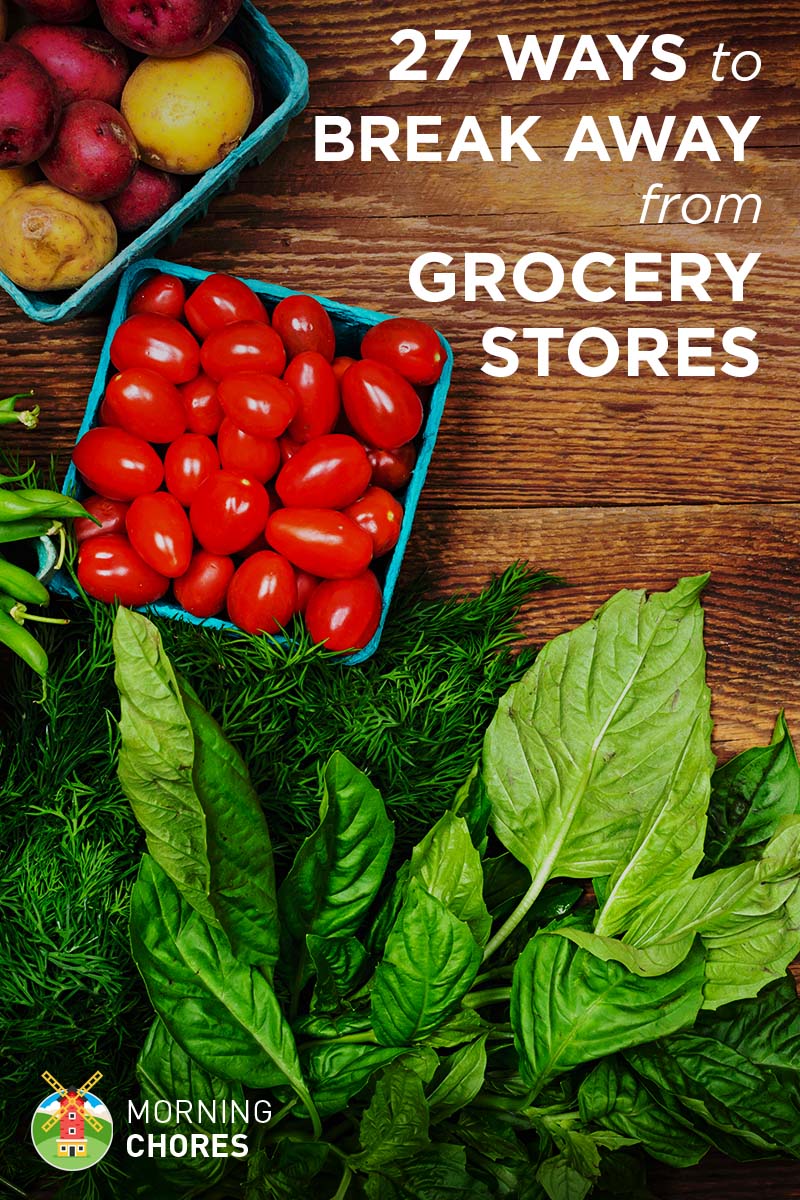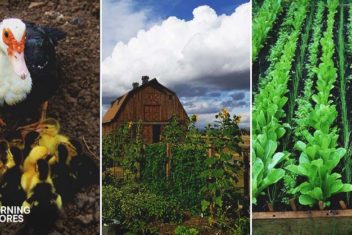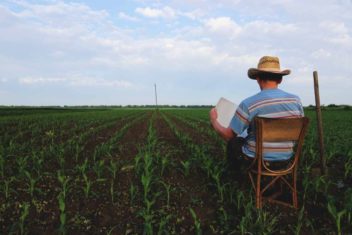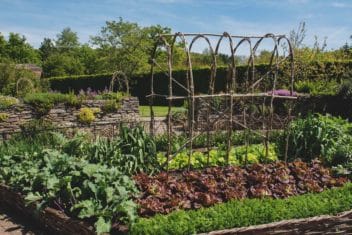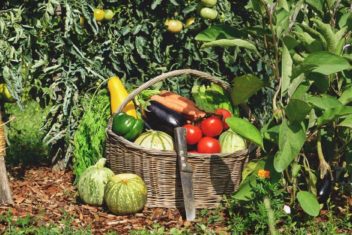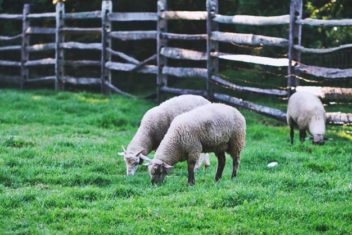Don’t you dread that weekly trek to the grocery store only to be unsure of the groceries you are buying; to stand in long lines and battle crowds; and throwing away a lot of money you worked really hard to earn?
I do too!
That is why I began searching for ways to break free from that whole routine.
You may think that is impossible because we need food. Yes, we do… but we don’t have to be chained to our grocery stores any longer.
1. Discover Your Inner ‘Julia Child’….Or At Least, Your Inner ‘Sandra Lee’
For those that don’t have a clue what I’m talking about, Julia Child was a great American chef that debuted in the 60’s and had multiple successful cooking shows.

File photo of Julia Child in 1975. Credit: Getty Images.
Sandra Lee is a more modern television personality, famous for her TV show ‘Semi Homemade with Sandra Lee.’
Basically, what I’m saying to you is: learn to cook.
If you can’t make it from scratch (like Julia Child) then pull out your Sandra Lee and make things “semi-homemade.” It may be more costly than going 100% from scratch but it still beats eating out or relying on freezer meals for nutrition.
Once you learn to cook the rest of the following options will be fair game for you.
2. Become The ‘Cake Boss!’
You guessed it! I’m talking about baking.
Just as cooking (from scratch, if possible) is super important to breaking away from buying groceries, so is baking.
If you learn how to bake your own cakes, cookies, and fresh bread then you’ll never be dependent upon the bread aisle or bakery section again!
You will see further down the list that you can get your ingredients for these items in many other places besides the grocery store. If you know where to get the ingredients, you need to know what to do with them once you have them.
Don’t be intimidated about learning to bake. This site is a great place for beginners to start.
3. Create A Beautiful Indoor Herb Garden
You don’t have to grow your herbs indoors. You can dedicate a little section of your yard or garden to growing your own herbs outdoors.
Growing your herbs indoors has never been easier, though. It adds a quaint look to your kitchen and is super convenient. If your herbs are convenient then you are more likely to use them.
You can grow your own herbs for a fresh addition to your dishes. You can also grow them to dry and make your own spices. You can also make fresh herbal teas with them!
There are so many ways to utilize fresh herbs once you decide to grow them. Here are a few ideas on how to incorporate a herb garden into your kitchen.
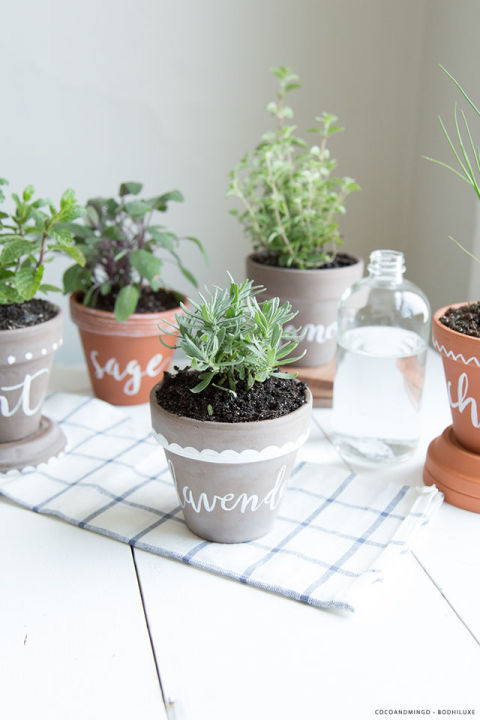
4. Not All Groceries Have To Come From A Shelf
There are many items we are just programmed to think, “I’ll run to the grocery store for that!” Things such as butter, pasta, bread, and yogurt (just to name a few) don’t have to come from a store shelf.
You can make these items in your own kitchen with just a few simple ingredients.
Butter can be made from cream. Pasta can be made from flour and eggs. Bread takes a few simple ingredients such as flour, yeast, and water. Yogurt can be made easily in your crockpot.
These are just a few examples that will hopefully trigger the thoughts, “How can I make this?” the next time you are tempted to run to the store for something. You might just find that you don’t have to leave home.
5. Plant Your Own Produce Section: Part 1
Fruits are one of the main items people go to the produce section for. Their naturally sweet taste and all of the nutrients that are packed into a yummy little package is enough to keep us coming back week after week.
But wouldn’t it be much easier just to go out in your backyard and get a piece of fruit when your heart so desired?
Of course it would!
Planting your own fruit trees is not as difficult as some might think. Here is a great article all about planting fruit trees.
You can plant grape vines, strawberries, and a berry patch. They all have everbearing options so you plant them once, and you are done. They will come back year after year for your enjoyment and to help give you what you need without a trip to the grocery store.
6. Plant Your Own Produce Section: Part 2
Vegetables are another necessary part of our diets. We need their many nutrients in order to have healthy bodies and live healthy lives. We don’t have to trek through our grocery store’s produce department to find them, though.
No, we are capable of growing them in our own yards!
You don’t have to grow a large garden. You can start with growing something smaller that will supply only what you will use in a season.
Here are a few ideas of how to design a small garden for your yard. Growing your own vegetables allows you to know what you are eating and supports an all-around healthier lifestyle.
7. Eat Your Landscaping
No, I’m not encouraging you to start grazing in your front yard.
However, there are some people that are really restricted as to what they can grow in their own yards because of their Home Owner’s Association. What about those people?
Don’t worry. You aren’t strapped to the grocery store for life. You can plant some great plants in your landscaping that won’t stand out yet are edible.
Asparagus is one of those plants. You plant it once and it will come back year after year.
Tuck it in behind your shrubs and no one would ever know. Plant it in plain sight and people still would never know.
Here is a great article that informs you on how to mix edibles into your current landscaping.
8. Leave The Canned Groceries on the Shelf…You Can Make Your Own
Preserving your own food allows you to take full advantage of growing your own food. It is inevitable if you plant enough of something, you will have more than you can eat in a season.
Don’t throw it out! Learn to preserve it.
There are many options for preserving food. For the beginner that is a little intimidated by canning, you can still dehydrate, ferment, and freeze your own food.
For those that are familiar or want to learn something new: canning is a great process to learn. It allows you to preserve as much of your own food as possible.
Put all 4 of those options together, and you are ready to walk away from buying groceries for good!
9. Accept Someone’s Gratitude
Homesteaders are very giving people.
They know how hard it is to live outside of the normal realms of society. They know the effort a garden takes each year. They get it because they live it.
So don’t be surprised if a nearby homesteader has an abundance (even more than they can preserve), and they give it away.
Here is an even bigger pill to swallow: if they offer it to you…take it.
Don’t be too prideful to turn down someone else’s generosity. Don’t be afraid to trade with that individual, either. That is how homesteading works…..we lean on one another and share what we have to help everyone out.
Here is a bit of news: your homesteading neighbor wants to avoid the grocery store just as much as you do! So be friendly neighbors!
10. Forage For Your Food
This one turns a lot of people off because it requires a bit of research. You need to study up on what is edible around you and what is not. You need to make sure you can properly identify food.
However, if you are willing to put in that little bit of work, you’ll be amazed at the goodies you can bring home after a walk through nature.
There are tons of nuts that can be harvested.
You can harvest some berries that way as well. You can also find crab apples and TONS of greens that can make up a fresh and free salad.
Foraging can be very beneficial in helping you stay away from the grocery store.
11. You want to ditch groceries? Join ‘The Club’
‘The Club’ I’m referring to is a food buying club.
These clubs are basically a group of people that don’t want to fool with the grocery store anymore. So they get together and start buying directly from the food vendors.
Because the order is large (since there are multiple individuals or families ordering) you get a discount…..and the food gets delivered directly to you!
This is actually an opportunity to make money as well.
If you form your own club, Wholeshare (a food buying company), will give you a 5% commission on each order. This allows you to avoid the grocery store and make a little extra money to further your homestead simultaneously.
Not a bad deal!
12. Shop A Different Kind Of Market
If growing all of your own food isn’t something you are ready to dive into right off of the bat, there are other options. As mentioned, there are food buying clubs and foraging.
There are also other simpler options such as shopping at local Farmer’s Markets.
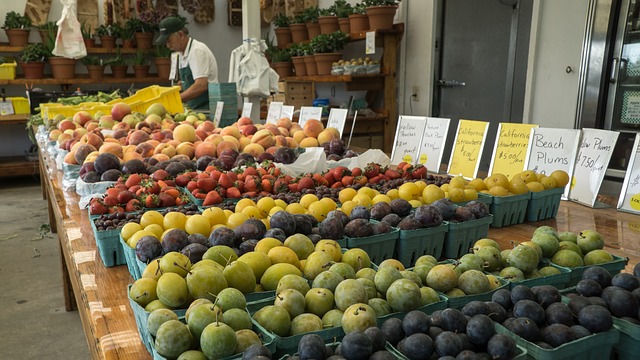
By shopping at local Farmer’s Markets, you get to meet the person that raised the food; ask questions about the food you are buying; and know exactly where your food came from.
How many grocery store retailers can tell you all of that in a shopping trip?
It also helps support local farmers and small businesses in your area. Even if you do grow a lot of your own food, shopping at local Farmer’s Markets lets you get variety.
There are times that some of our crops fall flat or maybe we don’t want to grow something because we know we won’t eat a lot of it. Shop the Farmer’s Market for those special items.
Farmer’s Markets are a great option and one that is available to most anyone.
13. Call On John…. ‘Farmer John’ That Is
So maybe your local farmer’s name isn’t John. That’s okay.
If you shop at the Farmer’s Markets you are bound to meet local farmers. That is kind of a no-brainer. Well, form relationships. Ask if you can come shop directly with him/her.
A lot of times they will say, “Yes!”
This gives you the opportunity to directly support your local farmer. You are also able to see where your food is grown. You may also find more items than what is offered at the Farmer’s Markets.
Shopping directly with local farmers can land produce, fresh milk (sometimes…depending upon laws where you are located), and meat! That is an amazing opportunity for any shopper.
14. CSA’s Are The Way To Avoid The Grocery Store
A CSA is a Community Supported Agriculture group. You pay upfront for a share of the veggies that year. You get a weekly delivery of fresh produce (and sometimes meat) that equals what you paid for.
This allows you to buy local, know your producer, and get all of your produce without stepping foot into a grocery store.
15. Shop The Side Of The Road
This may sound less than appealing to some but bear with me. I’m talking about produce stands.
Many ‘Mom and Pop’ produce stands still exist. They set up during different times of the year and sell their merchandise on the sides of the roads.
They may have an actual cart. Some actually sell their produce out of the backs of their pick-up trucks. Either way, it is just local farmers or store owners that have an excess of product and are trying to make a few extra dollars.
The produce is fresh and once again, it allows you to know where your food is coming from while supporting your local people.
16. One Harvest Food Ministries/ Gaballi Foods
These don’t need a fancy title. One Harvest Food Ministries and Gaballi Foods within themselves are an amazing option for anyone. There are no income requirements.
These people just want to help everyone afford good food and avoid the high prices of the grocery stores. You will have to check and see which company is servicing your area.
You start online and see what foods they have available each month. They take all forms of payment. You place your order online or you can search for a local place that is taking orders for them. (It is usually a local church.)
You order your food, and they give you a delivery date and time. You show up to the place of delivery and collect your food. It is that simple.
17. Feed Stores Are Not Just For Animals
Remember back at option #2 I told you that you could purchase your baking ingredients in other places beyond grocery stores?
Well, here we are! You can grocery shop at your local feed stores.
Feed stores sell wheat, barley, oats, and many other grains that are perfectly suitable for human consumption. You may need to buy a wheat grinder to make your own flour. However, a lot of feed stores sell large quantities of flour as well.
This allows you to purchase larger quantities at lower prices. It also allows you to know where your food has come from.
You can usually purchase grains in 25-50 pound bags. The good thing about buying whole wheat instead of the already ground flour is that wheat seed will last forever. So grind it as you need it and never worry about waste!
18. Grocery Shop For Your Meat In The River Or In The Woods
If you are a meat eater, one free resource for meat is in your local rivers and in local wooded areas. There are designated seasons for hunting and fishing.
However, if you invest in the proper equipment and licensing to be able to partake in such activities, the harvest is well worth it!
You will be able to fill your freezer with local animals such as fish, deer, elk, bison, wild turkey, duck, and many other animals that are native to your area.
This is better than going to the grocery store and paying a premium price. You will know what you are bringing home and it is guaranteed fresh!
19. Plant ‘Bacon Seeds’

familyfriendlydaddyblog.com
Obviously, I’m not serious. If you could plant bacon, I’d be growing a whole bacon farm!
But you can raise your own meat! Animals such as chickens, ducks, rabbits, pigs, cows, goats, and many more can be raised on your land for the purpose of butchering.
Butchering animals vary in the process but is worth the effort to have a constant meat source. It also allows you to know what you are eating because you control what you feed your animals.
Raising your own meat is a great way to avoid the meat department or the deli at the grocery store.
20. Raise Your Own ‘Henny Penny’
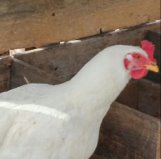
Hens are amazing animals to raise beyond the meat they can provide.
If you are familiar with the nursery rhyme, Henny Penny or Chicken Little, you know that she was the fat, little hen that ran around in a panic thinking that the sky was falling. In all reality, hens are kind of like that.
They provide hours of entertainment chasing bugs. They cackle and make all kinds of “chicken talk.” The most amazing thing about hens is the proud call they make to let the world know they laid a fresh egg.
That is why you want your own ‘Henny Penny’ or three. Your precious ‘Henny Penny’ can help you avoid the dairy section each week with her great egg laying abilities.
Read this guide to learn more about raising chickens.
21. Strike Gold In Your Backyard!

I’m not encouraging you to start panning for gold in your backyard, but I am encouraging you to start a beehive.
Bees require very little effort. You must provide their wooden hive and plant lots of flowers for them to feed on. Other than that, they do their own thing!
What you get from planting those flowers and providing them a nice home, is a lot of honey.
You can buy your own honey from local beekeepers. However, if you just want the experience or added ‘oomph’ they provide for your garden then invest in your own. Bees can be so beneficial.
22. You Can’t Give Up Your Coffee And You Can’t Grow It….. Now What!?
This article gives you great insight on how to substitute your coffee in the most natural way possible. The substitution: Clean Dandelion Roots.
Basically, you clean the roots of dandelions and use them as a coffee substitute.
However, if that still doesn’t sound appealing then you can always order your own coffee beans and grind them yourself! This still helps you to steer clear of the grocery store!
23. DIY Maple Syrup
I thought I had to live in a much colder area to be able to make my own maple syrup. That was until I read this article! She advised me that I can tap any maple tree and get syrup….not just a sugar maple tree.
Here is how you can sugar and make your own maple syrup!
24. Practice Contentment
These last few points are going to hone in on an attitude adjustment more than anything. The reason: your attitude is going to have to change on this journey of avoiding the convenience of grocery shopping.
The first thing you will need to focus on is contentment.
When you go to your pantry, you may be in the mood for some quick snacks such as prepackaged cookies. You aren’t really wanting to bake your own cookies. You look, and all you see are canned fruits, vegetables, and a freshly baked loaf of bread. It isn’t really what you want, though.
You have to be content with what you have. Otherwise, you’ll put all of this effort into producing your own food or shopping in alternative places, only to find yourself right back in the grocery store line for that food you are simply craving. Contentment is huge in this journey!
25. O-R-G-A-N-I-Z-A-T-I-O-N
Yes, I literally spelled that one out for us.
Why?
Because it is so important to be organized.
Making and storing all of your own food requires organization in your food storage efforts. You need to know what you have on hand. The reality: you are going to have A LOT!
Here are a few ideas to help you keep your pantries organized. This will stop you from panicking in those moments that you need something for a recipe and feel the pressure to run to the store to get it.
If you know what you have on hand then this shouldn’t be an issue. If it is an issue, see step #4.
26. Don’t Waste What You Have
Not wasting food may not seem like a way to avoid the grocery store…but it is.
The reason, if you don’t waste what you have then you won’t have to go shopping for it. You may be someone that thinks, “I can’t do any of this! I don’t want to shop around for my food, and I don’t want to grow it either.” Then this step is for you!
If you don’t waste your food, it may not stop you from grocery shopping at the grocery store altogether. However…it will stop you from shopping as often. This matters because with each week you avoid the grocery store, you gain more independence.
Next thing you know, you’ll gain confidence and start trying out those things you never thought you could do!
27. What About Everything Else We Buy At The Grocery Store?
We all shop or have shopped at the grocery store. When we go we often buy more than just food. Below are a few links to sites that will help you make or buy online some of the items that we need beyond food.
By making these items or even ordering them, it keeps us out of the stores and less tempted to put those chains of convenience back on.
